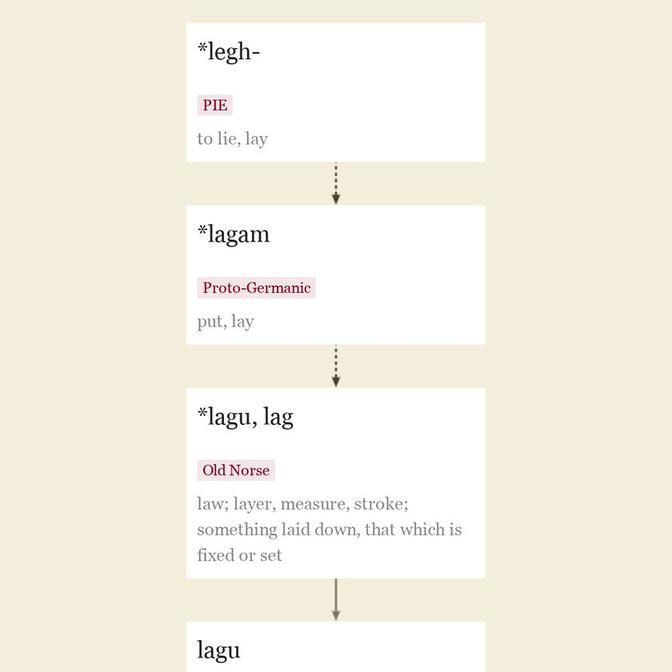Old English lagu (plural laga, combining form lah-) "ordinance, rule prescribed by authority, regulation; district governed by the same laws;" also sometimes "right, legal privilege," from Old Norse *lagu "law," collective plural of lag "layer, measure, stroke," literally "something laid down, that which is fixed or set."
This is reconstructed to be from Proto-Germanic *lagam "put, lay" (from PIE root *legh- "to lie down, lay"). The modern word is thus a twin of lay (n.2) as "that which is set or established."
Rare in Old English, it ousted the more usual ae and also gesetnes, which also were etymologically "something placed or set."
In physics, "a proposition which expresses the regular order of things," from 1660s. Law and order have been coupled since 1796. To lay down the law (1752) is pleonastic (the "law" in the figure is biblical law, laid down from the pulpit). Poor laws provided for the support of paupers at public expense; sumptuary laws restrained excesses in apparel, food, or luxuries.
It is more common for Indo-European languages to use different words for "a specific law" and for "law" in the general sense of "institution or body of laws," for example Latin lex "a law," ius "a right," especially "legal right, law."
Indo-European words for "a law" are most commonly from verbs for "to put, place, set, lay," such as Greek thesmos (from tithemi "to put, place"), Old English dom (from PIE *dhe- "to put, place, set"), Lithuanian įstatymas (from statyti "cause to stand, set up, establish"), Polish ustawa (from stać "stand"). Also compare Old English gesetnes (above), statute, from Latin statuere; German Gesetz "a law, statute," from Old High German gisatzida "a fixing, determination, assessment," with sezzen (modern German setzen) "to make sit, set, put."
Words for "law" in the general sense mostly mean etymologically "what is right" and often are connected with adjectives for "right" (themselves often figurative uses of words for "straight," "upright," "true," "fitting," or "usage, custom." Such are Greek nomos (as in numismatic); French droit, Spanish derecho, from Latin directus; Polish prawo, Russian pravo (from Old Church Slavonic pravŭ "straight," in the daughter languages "right"); also Old Norse rettr, Old English riht, Dutch recht, German Recht (see right (adj.1)).
[L]earn to obey good laws before you seek to alter bad ones [Ruskin, "Fors Clavigera"]

